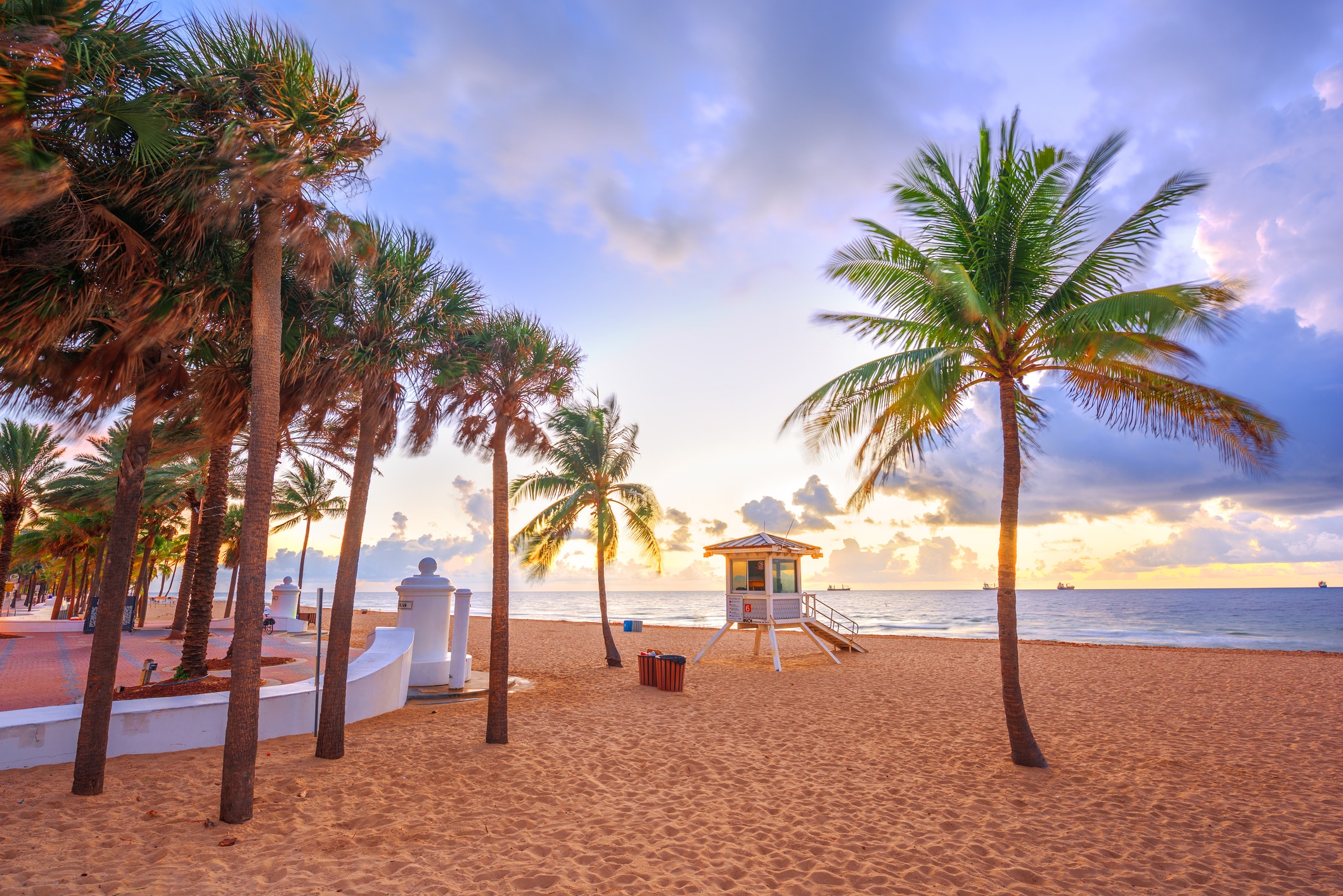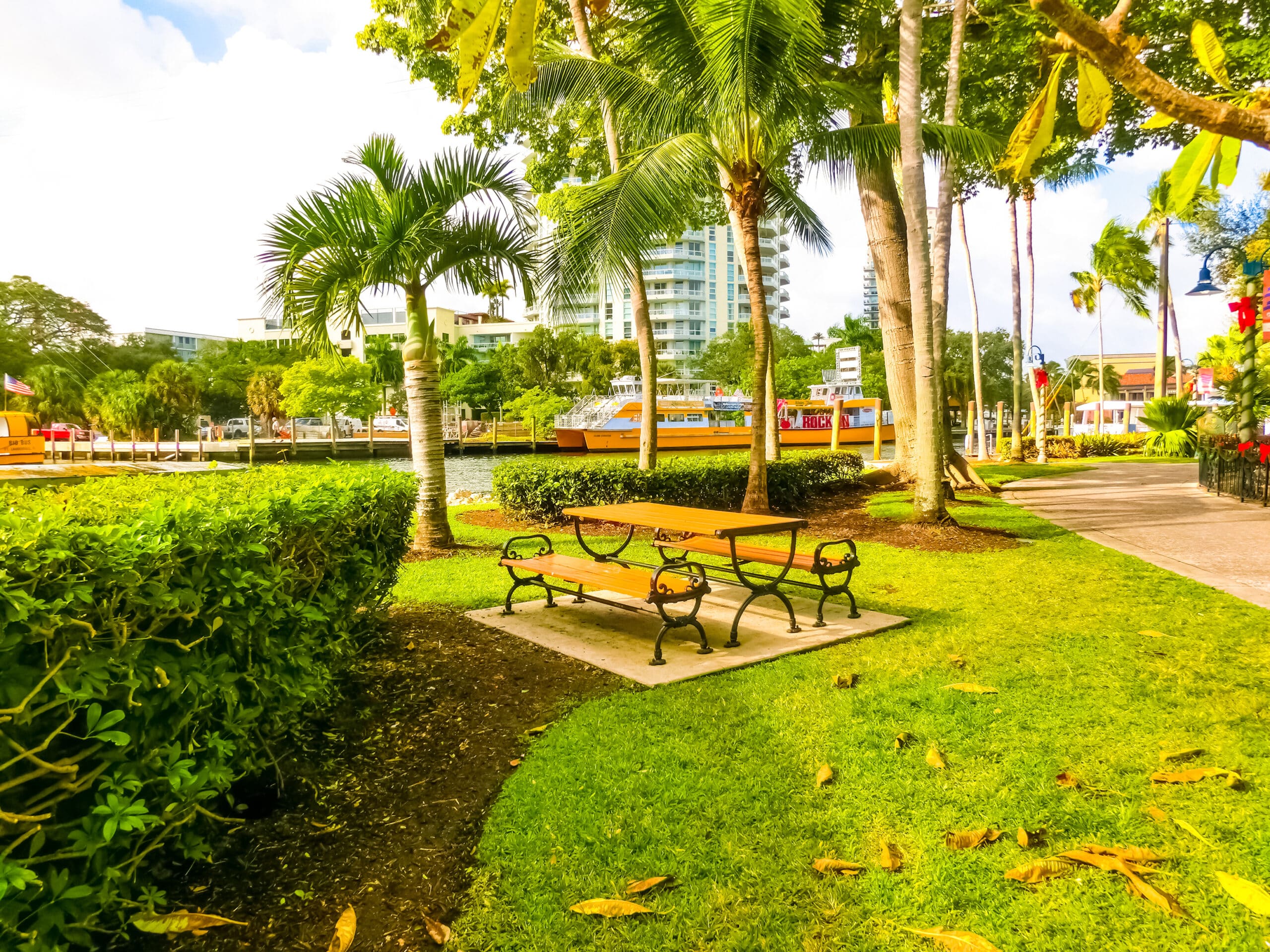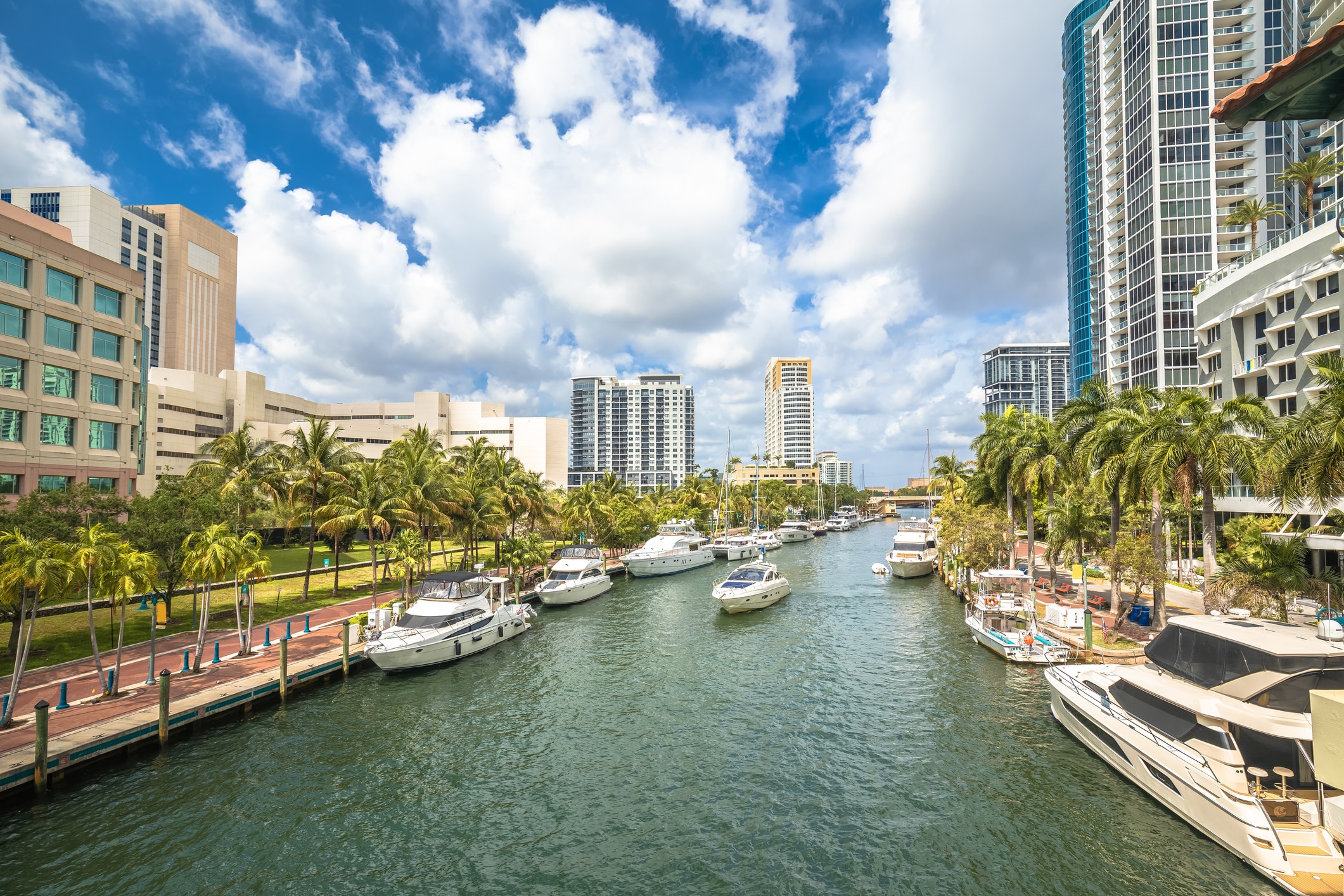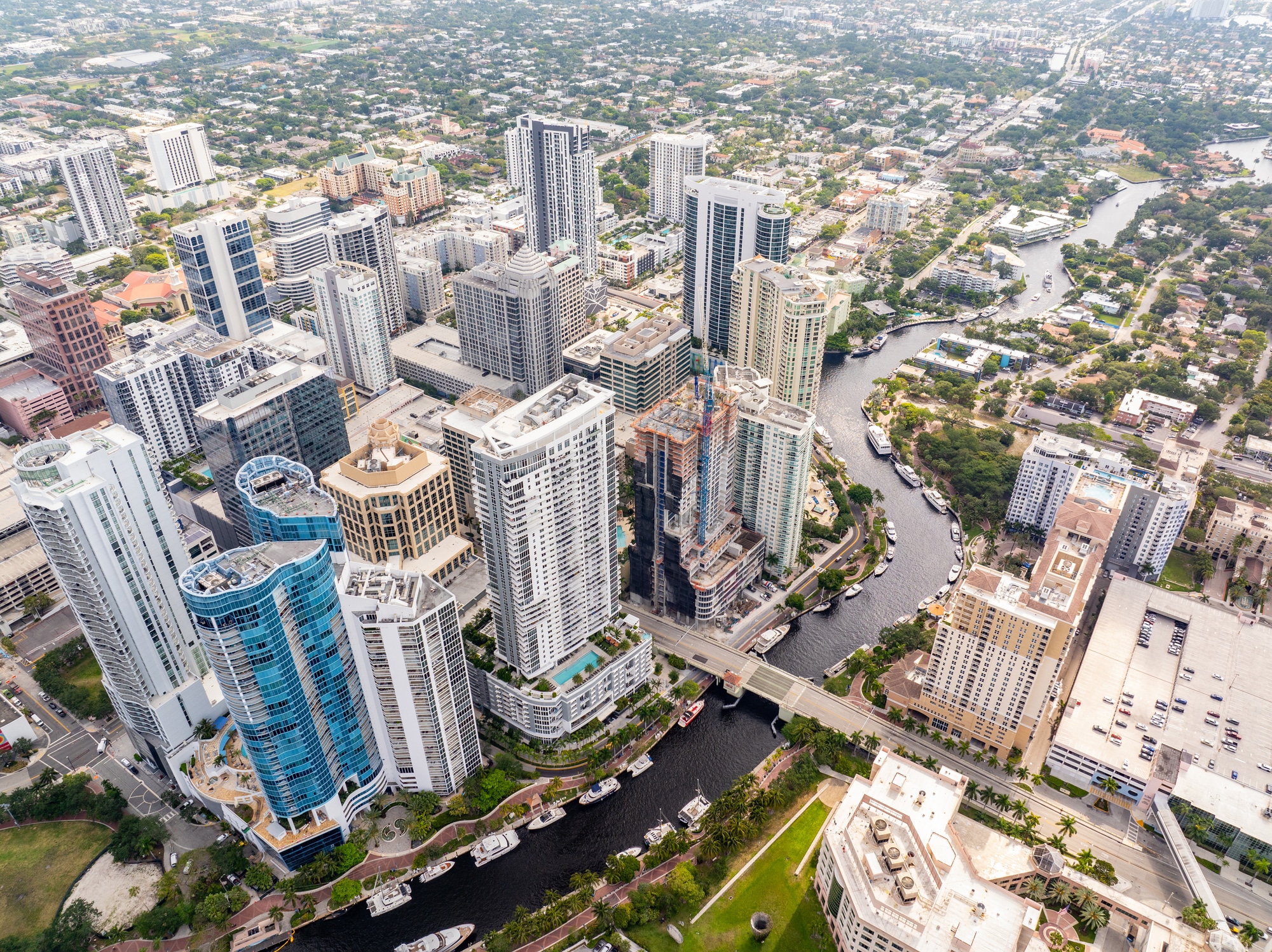(Updated November 25, 2024)
If you’re thinking about moving to Fort Lauderdale, get your boat ready (or start saving up!), because you’ll be living in the Yachting Capital of the World. Boasting over 100 marinas and more than 50,000 registered yachts, it’s a well-deserved designation.
With or without a boat, Fort Lauderdale is a haven for anyone who loves life on the water, thanks to 24 miles of beautiful beaches and around 300 miles of intercoastal waterways to explore. So whether you're a seasoned sailor or simply a fan of a waterfront view, there's plenty to love here.
Situated just 30 miles north of Miami, Fort Lauderdale offers a vibrant mix of tropical climate, diverse dining, and a thriving arts scene, drawing nearly 13 million visitors every year. But what is it actually like living in Fort Lauderdale? You may be asking, is it a good place to settle down? How safe are the neighborhoods? How much does it cost to live there? We’ve got some answers to help you make an informed decision.
8 Things To Know About Living in Fort Lauderdale
In this guide, we’ll take you through everything you need to know, from the cost of living and job opportunities to the city’s lifestyle and neighborhoods. Whether you’re coming from Chicago or Brooklyn, consider this your crash course in all things Fort Lauderdale.
1) Fort Lauderdale’s cost of living is quite a bit lower than LA and NYC
If you’re moving to Fort Lauderdale, the cost of living is likely top of mind. While it’s a bit higher than the national average, Fort Lauderdale remains a more budget-friendly choice when compared to major metropolitan hubs like Los Angeles or New York City.
For example, Fort Lauderdale has about a 26% lower cost of living than Los Angeles. That means someone earning $100,000 in Los Angeles would need only about $76,000 in Fort Lauderdale to maintain the same lifestyle.
The savings are even more noticeable when comparing Fort Lauderdale to New York City. Maintaining a New York lifestyle on a Fort Lauderdale budget? You’d only need around $38,836 here versus $60,000 in NYC, a significant 35.3% decrease. And you gain another advantage — it’s sunnier in Fort Lauderdale!
Fort Lauderdale Cost of Living Breakdown
Average home value: $520,867
Average rent: $2,705
Median household income: $75,376
Fort Lauderdale Average Living Expenses
Energy bill: $208.07
Phone bill: $201.28
Gas: $3.44
Loaf of bread: $4.22
Gallon of milk: $4.97
Carton of eggs: $3.69

2) Fort Lauderdale offers a thriving job market
Looking for a job? Fort Lauderdale’s job market has shown steady growth, with a 2.5% increase in private sector employment as of August 2024. More than 20,000 jobs were added in sectors such as trade, transportation, utilities, and government.
As of September 2024, the city’s unemployment rate stands at 3.4%. That’s slightly higher than the previous year, but still below the national average of 4.1%, indicating a healthy job landscape.
As you’re considering job offers, you’ll want to compare salaries as well. For most, a livable salary in Fort Lauderdale falls between $50,000 and $60,000 annually, aligning with the area’s average salary of $53,484. This range covers essential expenses for a comfortable lifestyle — because in Fort Lauderdale, you’ll definitely want a little extra for those beach days!

3) Plenty of transportation options make getting around Fort Lauderdale a breeze
Getting around Fort Lauderdale is pretty easy, thanks to a variety of transit options and scenic routes. For those relying on public transportation, Broward County Transit (BCT) operates a bus network covering Fort Lauderdale and beyond. The free LauderGO! Community Shuttle also connects neighborhoods to major destinations. For regional trips, Tri-Rail links Fort Lauderdale to Miami and West Palm Beach.
For a more unique type of travel, the Water Taxi offers scenic transport along the Intracoastal Waterway. And the Brightline rail provides high-speed connections to nearby cities of Miami, West Palm Beach, Boca Raton, and Orlando. Fort Lauderdale’s bike-friendly infrastructure also makes it convenient to explore the city on two wheels.
If you’re opting for your own vehicle, be aware roads get pretty congested during rush hour on weekdays. And if you’re headed to the beach, allow extra time to find a parking spot!
Here’s a quick list of Fort Lauderdale’s impressive array of transportation options:
Broward County Transit (BCT): Extensive bus network across the city and county
LauderGO! Community Shuttle: Free shuttle service connecting neighborhoods to popular areas.
Tri-Rail: Commuter rail linking Fort Lauderdale, Miami, and West Palm Beach
Water Taxi: Scenic water transit along Fort Lauderdale’s waterways
Brightline: Higher-speed inter-city rail service to Miami, West Palm Beach, and Orlando
Biking: Dedicated bike lanes and bike sharing available across the city
4) Fort Lauderdale’s crime rate is above the national average, but there’s still plenty of safe areas
Is Fort Lauderdale safe? That’s a key question for anyone moving to Fort Lauderdale. The city’s overall crime rate is above the national average, reporting a total crime rate of 41.26 per 1,000 residents — but, as you can imagine, the rate depends on where you find yourself.
For those prioritizing safety, Coral Ridge, Victoria Park, and Harbor Beach are popular choices. These areas are known for lower crime rates and strong community ties. Do your research to pick a good neighborhood, and Fort Lauderdale can be a safe and welcoming place to call home.
5) Fort Lauderdale’s a great choice for sun-seekers, but don’t forget your umbrella
Living in Fort Lauderdale means enjoying warm, sunny weather almost year-round. The city’s tropical climate brings plenty of sunshine, with average temperatures between 62°F and 89°F.
You do have to be prepared for some rain, however, as this is definitely not desert terrain. Fort Lauderdale averages about 60 inches of rain a year, with most of that occurring from June through August. And much of that rain comes from severe weather, taking the form of thunderstorms and hurricanes.
South Florida’s hurricane season runs from June through November. Residents quickly learn to embrace the sunny days while staying prepared for the brief but intense storms that come with living near the coast.

6) South Florida’s beautiful beaches are just a short drive away
Fort Lauderdale is famous for its stunning coastline — which is probably one reason why you’ll find so many boats here. That means there’s also miles of sandy beaches just minutes from most neighborhoods.
Soak up the sun at Fort Lauderdale Beach, explore Lauderdale-By-The-Sea’s charming shops and coral reefs, or take a weekend trip to nearby Miami Beach. For beach lovers, Fort Lauderdale offers endless ways to unwind by the water.
7) Florida’s low tax burden adds to Fort Lauderdale’s affordable cost of living
Sure, no one likes taxes. But the Floridians really don’t like ’em. In the Sunshine State there’s no income tax, which means residents enjoy more take-home pay compared to many other states.
Beyond that, property taxes are also relatively low — and the state doesn’t tax essential items such as groceries or prescriptions. With all this, you might be able to sock away more money into savings in Fort Lauderdale.
8) It’s a prime spot for exploring South Florida
Just 30 miles north of Miami and a short drive from West Palm Beach, Fort Lauderdale’s central location in South Florida makes it easy to take advantage of all the region has to offer, such a taking in some culture at the Norton Museum of Art in West Palm Beach or dancing the night away in Miami’s South Beach.
If outdoor adventures are more your speed, the Everglades aren’t too far away. Here you can get a glimpse of some of Florida’s interesting wildlife, from crocodiles and manatees to the bright-pink flamingos.
Fort Lauderdale’s Best Neighborhoods
Whether you’re looking for a family-friendly community or something aimed at retirees, Fort Lauderdale has a neighborhood to suit your lifestyle. Here are three of the best neighborhoods the city has to offer. And no matter where you choose to live in Fort Lauderdale, you’re guaranteed plenty of sunshine.
Coral Ridge
Coral Ridge is a family-friendly neighborhood known for its top-rated schools, safe streets, and beautiful parks. Living here means easy access to recreational spots like George English Park, which features playgrounds, sports courts, and a boat ramp.
Families also appreciate the proximity to The Galleria at Fort Lauderdale for shopping and dining options. Coral Ridge is close to the beach, allowing for quick weekend outings, and offers a quieter, suburban feel with the convenience of being near central Fort Lauderdale.

Victoria Park
Young professionals and singles seeking a lively area with an active lifestyle will appreciate Victoria Park. The neighborhood is walkable, with a mix of trendy cafes, bars, and shops. Moreover, this neighborhood’s proximity to Las Olas Boulevard means residents are close to Fort Lauderdale’s best nightlife and dining.
Victoria Park is also known for its charming tree-lined streets, diverse housing options, and social vibe. For those who enjoy outdoor activities, Holiday Park offers green spaces for jogging, sports, and relaxation.
Harbor Beach
For retirees looking for a quieter, more private community, Harbor Beach offers exclusive gated living with private beach access. This serene neighborhood provides a blend of luxury and tranquility.
Residents here enjoy access to the Harbor Beach Surf Club and a marina, so if you’ve got that boat, this might be your spot. Harbor Beach is also just a short drive from downtown Fort Lauderdale, which means shopping, dining, and healthcare facilities are easily accessible.
Living in Fort Lauderdale: Pros and Cons
There’s a lot to consider when moving to Fort Lauderdale. Let’s break down the pros and cons.
Pros of living in Fort Lauderdale
Warm weather year-round: Enjoy endless sunny days and mild winters.
Beach access: Popular beaches such as Hollywood Beach are just a short drive away, with easy access to fishing, snorkeling, and other coastal activities.
No state income tax: Florida’s low tax burden makes life more affordable.
Diverse neighborhoods: Fort Lauderdale offers plenty of options for families, professionals, and retirees alike.
Cons of Living in Fort Lauderdale
Higher crime rates in some areas: Safety varies significantly by neighborhood.
Hurricane season: Residents must be prepared for stormy months, potential evacuations, and the possibility of real damage to their homes.
Traffic and congestion: Busy roads and peak-hour congestion are common.
Is Fort Lauderdale Right for You?
So, is living in Fort Lauderdale a good choice? Absolutely, if you’re looking for a vibrant coastal city with year-round sunshine, beautiful beaches, and diverse neighborhoods. Here, you’ll find social hubs for young professionals, quiet, family-friendly areas, and luxurious waterfront properties. While the city has a few challenges, notably traffic and hurricane season, the perks — low taxes, warm weather, and access to the activities of South Florida’s — make it an appealing place to call home.

Make Your Fort Lauderdale Move Easier
If you’re ready to make the move to Fort Lauderdale, let Colonial Van Lines handle the details. With our 50 years of interstate moving and our full-service experience — from packing and loading to driving and unloading — Colonial takes away some of the stress of relocating.
Get started with a free quote today!

